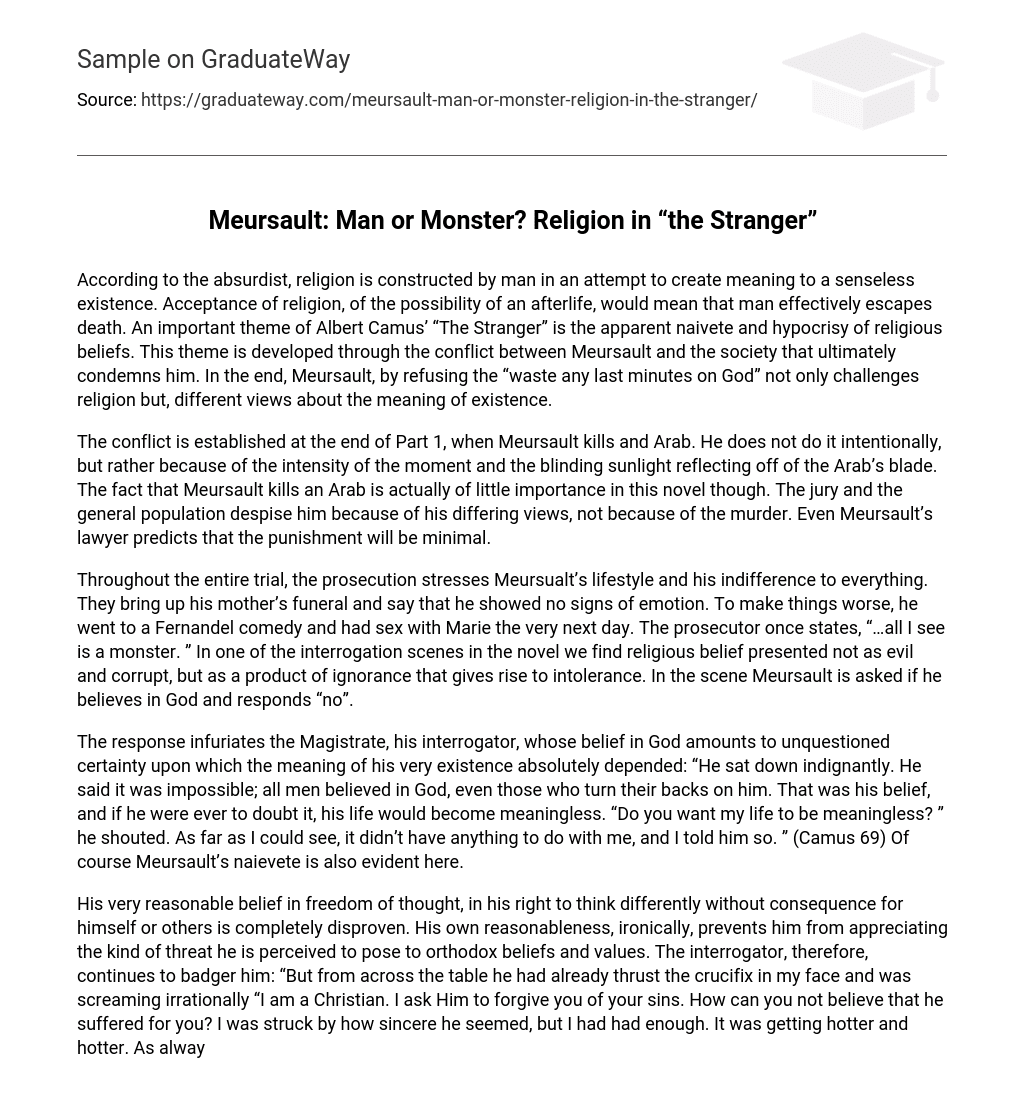According to the absurdist, religion is constructed by man in an attempt to create meaning to a senseless existence. Acceptance of religion, of the possibility of an afterlife, would mean that man effectively escapes death. An important theme of Albert Camus’ “The Stranger” is the apparent naivete and hypocrisy of religious beliefs. This theme is developed through the conflict between Meursault and the society that ultimately condemns him. In the end, Meursault, by refusing the “waste any last minutes on God” not only challenges religion but, different views about the meaning of existence.
The conflict is established at the end of Part 1, when Meursault kills and Arab. He does not do it intentionally, but rather because of the intensity of the moment and the blinding sunlight reflecting off of the Arab’s blade. The fact that Meursault kills an Arab is actually of little importance in this novel though. The jury and the general population despise him because of his differing views, not because of the murder. Even Meursault’s lawyer predicts that the punishment will be minimal.
Throughout the entire trial, the prosecution stresses Meursualt’s lifestyle and his indifference to everything. They bring up his mother’s funeral and say that he showed no signs of emotion. To make things worse, he went to a Fernandel comedy and had sex with Marie the very next day. The prosecutor once states, “…all I see is a monster. ” In one of the interrogation scenes in the novel we find religious belief presented not as evil and corrupt, but as a product of ignorance that gives rise to intolerance. In the scene Meursault is asked if he believes in God and responds “no”.
The response infuriates the Magistrate, his interrogator, whose belief in God amounts to unquestioned certainty upon which the meaning of his very existence absolutely depended: “He sat down indignantly. He said it was impossible; all men believed in God, even those who turn their backs on him. That was his belief, and if he were ever to doubt it, his life would become meaningless. “Do you want my life to be meaningless? ” he shouted. As far as I could see, it didn’t have anything to do with me, and I told him so. ” (Camus 69) Of course Meursault’s naievete is also evident here.
His very reasonable belief in freedom of thought, in his right to think differently without consequence for himself or others is completely disproven. His own reasonableness, ironically, prevents him from appreciating the kind of threat he is perceived to pose to orthodox beliefs and values. The interrogator, therefore, continues to badger him: “But from across the table he had already thrust the crucifix in my face and was screaming irrationally “I am a Christian. I ask Him to forgive you of your sins. How can you not believe that he suffered for you? I was struck by how sincere he seemed, but I had had enough. It was getting hotter and hotter. As always, whenever I want to get rid of someone I’m not really listening to, I made it appear as if I agreed. To my surprise, he acted triumphant. “You see, you see! ” he said. “You do believe, don’t you, and you’re going to trust in Him, aren’t you? ” Obviously, again I said no. He fell back in his chair. ” (Camus 68) Here Meursault appreciates the apparent sincerity of the Magistrate’s beliefs, but not the fact that those beliefs prevent the Magistrate from even tolerating Mersault’s different view of things.
The Stranger is not so much a story of crime and punishment, but of dissidence and punishment. Unlike in the novel “Crime and Punishment”, Mersualt never receives religious redemption. He continues to not conform to the ideological values and moral values of the society that condemns him to death. He is dissident because he does not accept the Christian worldview, does not feel remorse for his crime, and does not grieve for his own dead mother.
Camus shows how society can be more threatened by unorthodox beliefs and actions that contradict it’s own values than by the criminal actions it pretends to be most concerned about. In reality, Meursault is to be executed for failing to cry for his mother, not for murder. The Magistrate is completely incapable of accepting the possibility that the values of society that he represents might not be universal. For him, that would represent an unthinkable contradiction. For him, what he believes to be a universal truth is so compelling that everyone must believe the same.
Meursault’s simple no threatens the Magistrates very foundation of society. The Magistrate must believe that life has meaning, that existence in general has meaning. The contrary view that Meursault represents, that life and existence are absurd, is the biggest threat the Magistrate and all that he believes. Through this, Meursault threatens the social construction of religion and what the meaning of life, existence, and death really are. The trial does in fact turn Meursault into an existentialist hero, although it is ironic that he learns to appreciate life after his is effectively over.
The one time he shows any emotion is when he realizes that he does not want to die. When finally finding meaning in life he says, “And I felt ready to live it all again too… I opened myself to the gentle indifference of the world. ” In the beginning of the novel Meursault cannot relate to anyone. However this gradually changes as the story progresses. At the end of the novel Meursault hopes that a lot of people come to his execution with their burning hatred because at least they will have found something to believe in, and some meaning in their lives.





